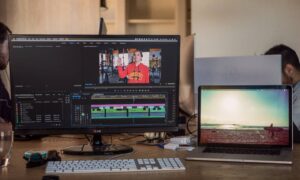Do you have a passion for video editing? Are you looking for ways to make money from home? If so, freelancing as a video editor may be the perfect career for you! In this blog post, we will discuss how to become a freelance video editor, what services you can offer, and how to market your business.

We will also provide tips on how to maintain a successful freelance career and make money through freelance video editing as a remote video editor. So, whether you are just starting or are looking for ways to take your business to the next level, keep reading to discover how to become a professional video editor!
Who Is a Video Editor?
A video editor is a creative professional who uses video and audio footage to tell a story. As a freelance video editor, you will be responsible for putting together a video, adding transitions and effects, and creating a finished product that is both visually appealing and engaging.
Video editors are often responsible for ensuring that the footage is coherent, flows well, and makes sense in the context of the story being told.
Video editors may also be responsible for adding graphics, music, and sound effects to the finished product. In some cases, they may also be responsible for shooting footage themselves. A video editor typically works closely with a director or producer to ensure that the vision for the project is being met.

They often have a keen eye for detail and an understanding of how to use editing techniques to create an engaging and effective final product.
How To Become a Freelance Video Editor
If you’re looking to get into freelancing, video editing is a great place to start. It’s a highly in-demand skill, and with the right training and equipment, you can easily work from home editing video production media and video content. Here are 10 tips to help you get started:
1. Get Training
There are many freelance video editors out there, but not all have had the proper training. Getting training can help you become a freelance video editor in several ways.
First, it will give you the technical skills that you need to edit videos properly. Second, it will give you an understanding of the different software programs that are available and how to use them in your freelance video editing career.
Third, it will give you an understanding of the different types of video formats and how to convert them. Fourth, it will give you an understanding of the different ways to export videos.
Fifth, it will give you an understanding of how to add transitions, effects, and titles to your videos. Lastly, it will give you an understanding of how to add audio to your videos.
All of these things are important when you are trying to become a freelance video editor. While you don’t necessarily need a degree in video editing, it helps to have some formal training. There are many online courses available, or you could sign up for an evening class at your local community college.
2. Invest in Good Equipment
For your freelance video editing jobs, one of the most important investments you can make is in good equipment. With the right tools, you can provide your clients with high-quality, professional-looking videos that meet their needs and expectations.
Investing in a good computer, video editing software, and other necessary equipment will help you create better videos, attract more clients, and ultimately earn more money. In addition, having good equipment will make your job easier and more enjoyable, leading to a better work/life balance.
While it may require a significant initial investment, investing in good equipment is essential for any freelance video editor who wants to be successful. You don’t need the latest and greatest tools to get started, but it’s important to have a reliable computer and editing software that can handle the demands of video editing.
3. Find Your Niche
As a freelance video editor, one of the most important things you can do is find your niche. Once you know what kind of videos you’re good at editing, you can start to focus on finding clients who need that specific skill set.

Not only will this help you stand out from other freelance video editors’ work, but it will also make it easier to find work that you’re passionate about. With the right passion, you can build a whole career in freelance video editing. In addition, once you’ve found your niche, you can start to build a network of fellow freelancers who specialize in the same type of work.
This can be invaluable when it comes to finding new jobs and getting advice and feedback on your work. So if you’re looking to become a freelance video editor, don’t underestimate the importance of finding your niche. It could very well be the key to success.
There are many different types of video editors, so it helps to focus on a particular niche or style of editing. This will make it easier to market yourself to potential clients.
4. Stay Up to Date
As a freelance video editor, it’s important to stay up to date on the latest industry trends and best practices. Not only will this help you land new clients, but it will also help you deliver high-quality work that meets their expectations. Here are a few ways staying up to date can help you become a successful freelance video editor:
- You’ll be able to offer the latest editing techniques and software because as technology evolves, so do the tools and techniques used by video editors. Staying up to date on the latest industry trends will allow you to offer your clients the latest editing techniques and software. This will not only impress them, but it will also give you an edge over your competition.
- You’ll be able to create better quality work by staying up to date on the latest trends. You’ll be able to create higher-quality work that meets your client’s expectations. Additionally, keeping up with the latest trends will help you troubleshoot any problems that might arise during the editing process.
- You’ll be able to stay ahead of the competition because the freelance market is becoming increasingly competitive. So, it’s important to do everything you can to stay ahead of your competitors. Staying up to date on the latest trends and technologies will give you an edge over other freelancers who aren’t keeping up with the times.
5. Network with Other Video Editors
Networking with other video editors is essential if you want to become a freelance video editor. By meeting other editors and professionals in the industry, you’ll be able to learn about new techniques, software, and workflows for successful video editing.
You’ll also be able to find out about job openings and get referrals for work. Additionally, networking can help you build relationships with other professionals who can provide support and advice as you navigate the freelance world.
Of course, building a network requires more than just making a few phone calls. You need to be active and engaged in your industry, attending conferences and networking events.
So if you’re serious about becoming a freelance video editor, make sure to get out there and start networking!
6. Build a Strong Portfolio
As a freelance video editor, one of the most important things you can do is build a strong portfolio. A portfolio is a collection of your best work, and it’s a great way to showcase your skills and capabilities to potential clients. There are a few things you should keep in mind when building your portfolio, and we’ll go over some of them here.
First, make sure to showcase a variety of your work. Include both short and long videos, as well as different genres and styles. This will help prospective clients see the full range of your abilities.
Second, make sure your videos are well-edited and look professional. Remember, your portfolio is a reflection of your work, so you want to make sure it’s top-notch.
Finally, keep your portfolio updated regularly. As you complete new projects, be sure to add them to your portfolio so that potential clients can see your latest work. You’ll also need to learn how to invoice as a freelancer for your projects.
By following these tips, you’ll be on your way to building a strong portfolio that will help you attract new clients and grow your freelance video editing business. When you’re just starting out, it can be difficult to land clients without a strong portfolio of work to show them.
7. Join Professional Organizations
In addition to networking and online job boards, one of the best ways to find work is by joining professional organizations. Professional organizations provide many benefits for freelancers, including access to job postings, networking opportunities, and educational resources.
For example, The Motion Pictures Editors’ Guild (MPEG) is a professional organization that represents over 100,000 members in the United States and Canada. MPEG offers its members access to a variety of resources, including job postings, industry news, and discounts on production-related supplies.

In addition, MPEG holds regular events where members can network with each other and learn about the latest industry trends. By taking advantage of these resources, you’ll be able to build your freelance business and secure long-term clients.
If you’re looking to become a freelance video editor, joining a professional organization is highly recommended.
8. Join Freelance Marketplace Firms
As a freelance video editor, one of the best ways to find work is by joining a freelance marketplace firm like Upwork. These firms connect businesses and individuals with freelancers who can provide the services they need.
By joining a marketplace firm, you’ll have access to a wide range of clients and projects. And because these firms carefully screen their clients, you can be sure that you’re only working with reputable businesses.
In addition, marketplace firms typically provide their freelancers with tools and resources to help them succeed. For example, many firms offer educational materials, such as guides and tutorials, to help freelancers hone their skills. And some firms also offer support services, such as project management assistance and payment processing.
By taking advantage of all that marketplace firms have to offer, you’ll be in a great position to succeed as a freelance video editor.
9. Promote Your Skills
When it comes to becoming a freelance video editor, promoting your skills is essential. There are a number of ways to do this, but the most important thing is to get your name out there.
One way to do this is to create a website or blog that showcases your work. Be sure to include samples of your work as well as information about your rates and availability.
Another great way to promote your skills is to join an online community of video editors like Fiverr. If you know how to get featured on Behance, you might find a variety of clients. This will give you a chance to network with other professionals and exchange tips and advice while building your video skills.
Finally, don’t forget the power of social media. A strong online presence can help you attract new clients and build your reputation as a top-notch video editor.
By taking the time to promote your skills, you’ll be well on your way to becoming a successful freelance video editor.
10. Build Your Soft Skills
As a video editor, your job is to take a video and turn it into a finished product that tells a story and engages the viewer. In order to be successful in this role, you need to have strong, soft skills.
Soft skills are personal attributes that affect your ability to interact with others and get work done. Examples of soft skills include communication, problem-solving, teamwork, and time management.
As a video editor, you need to be able to effectively communicate with clients in order to understand their vision for the project. You also need to be able to problem-solve when you encounter challenges during the editing process.

And finally, you need to be able to manage your time effectively in order to meet deadlines. Building your soft skills will help you become a more successful freelance video editor.
By developing these key skills, you will be better equipped to handle the challenges of the job and deliver high-quality work that meets your client’s expectations.
Related Questions and FAQs
How Much Do Freelance Video Editors Make?
The amount of money freelance video editors make varies depending on their experience and the projects they take on. Freelance video editors typically charge an hourly rate or a flat fee for their services, with experienced editors charging more than those who are new to the field. According to PayScale, the average salary for a freelance video editor is $25 per hour.
Is Video Editing Good for Freelancing?
Video editing is a great option for freelancers as it offers flexibility and the ability to work from home. With the right skills and attitude, you can be successful in this field and make a good living. Additionally, video editing is an in-demand skill, so there’s no shortage of opportunities for freelance video editors. It’s also a great way to gain experience as a digital entrepreneur and grow your business.
What Software Do Freelance Video Editors Use?
Freelance video editors typically use professional software such as Adobe Premiere Pro or Apple Final Cut Pro for their editing projects. These programs offer powerful tools and features that allow editors to create high-quality videos quickly and easily. Other popular software used by freelance video editors includes Avid Media Composer and DaVinci Resolve.
Do I Need a Degree to Become a Freelance Video Editor?
No, you don’t need a degree to become a freelance video editor. However, having an advanced degree in multimedia or film production can help you develop the skills and knowledge necessary for success in this field. Additionally, some employers may require job applicants to have experience or training related to video editing.
Final Words
In conclusion, becoming a freelance video editor is a great way to start your career in the industry. By following the tips outlined in this article, you’ll be on your way to success.
Related Resources



